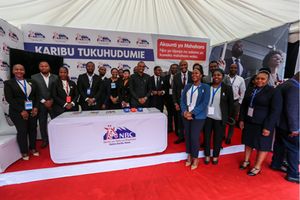PROFILE: Sculpting their way to financial freedom

Seif Chengibela, (left) and Shukuru Lindunga pose for a photo with some of their metal works. PHOTOSI DEVOTHA JOHN.
What you need to know:
Seif Chengibela and Shukuru Lindunga have proved that disability is not inability
Passing a captivating zebra sculpture along the Haile Selassie Road in Masaki along the village market, I was curious to know those who made the sculpture.
I was directed to the Art Gallery workshop by the people who were whiling away the time at a nearby supermarket.
After a brief introduction, the Art Gallery founders, Seif Chengibela, who was wearing a yellow kitenge, and Shukuru Lindunga, who was in an orange batik, were generous enough to talk to me.
The pair deal in metal sculptures made from recycled materials and were ready to share with me how they managed to set up a sculpturing project and challenges they face as physically challenged entrepreneurs.
Shukuru said being disabled did not deter them from setting up the art gallery last year. Armed with experience they had acquired from the Wonder Workshop, a Non-Governmental Organization that works with the disabled, both Lindunga and Chengibela realized that disability was not inability and that they had what it takes to be their own bosses.
“The NGO was dealing in manufacturing metal handcrafts, thank goodness we could sell our products in and outside the country,” he notes.
He says when the NGO was closed down for reasons which were best known by the founder, the two friends embarked on seeking the capital to establish their own workshop in Masaki. The art gallery which is traditionally into metal crafting combines with modern designing blended expertly to deliver art ware that is both stylish and valuable.
“We are set to make stylish and salutary merchandise so as to win the market,” says Shukuru, adding that the recycled materials are used to sculpture models of zebra, crocodiles and many other products depending on the market demand.
The art gallery founder notes that they utilize unused spare parts and scrap metal like nuts and bolts to beautify their products, thanks to their nurtured talents and creativity.
Challenges
According to Shukuru one major setback is finding a ready market for their finished products. He thinks the fact that many Tanzanians are used to seeing only foreigners purchasing art works could be among the reasons behind.
He says more needs to be done to change the attitude of many Tanzanians who are yet to see the importance of using art pieces and crafts to beautify their homes and offices.
The businessman says lack of working capital is hindering the gallery from buying enough materials. This impacts negatively on their ability to pay rental bills.
“We were highly taxed in the first place. We surely know that tax is a must but there should be a leverage coupled with some grace periods for business startups. Our President has been very positive to entrepreneurs. It is time his subordinates walked the talk,” says Shukuru.
Success and wayforward
Shukuru’s partner, Seif Chengibela says their enterprise has managed to employ over ten workers who too are physically challenged.
“We have a talented team of craftsmen and designers who are from across the country. Quality is our utmost concern, a move that sees customers flocking to purchase our products,” he says .he dreams of his products penetrating the international markets.
Seif says through his art work he has managed to build his own house and send his children to school, although the proceeds are at times not enough to pay newly employed workers who are also are disabled.
Word of advice
Seif calls upon members of the society who are physically challenged to work hard in a bid to realize their unlocked potentials.
“Most people think that being physically disabled is a condemnation to a life of begging and suffering. I advise fellow comrades to take up the challenge and unlock their potential.”
He calls on the philanthropists and the society at large to help raise funds to start up the physically challenged on self-help income generating ventures. The entrepreneur wants government to review taxes paid by physically disabled entrepreneurs in a bid to empower them.
“The business is not currently good. It is time the taxman reduced levies to make us sustain our operations. Rentals as well as utility bills are charged the same across the board regardless of what you earn. Something needs to be fixed up to leverage the situation,” he says.
Brief background
Born 45 years ago in Morogoro Region, Shukuru Lindunga is a father of three. His art gallery co-founder Seif Chengibela, also 45, is a father of five, born in Kisiju, Mkuranga District.
They both trained in vocational skills at Yombo Vocational Training Centre in 1991 and 1993 respectively. Shukuru did a certificate in welding while Seif did carpentry.
The pair can spend an average of one to two hours trekking everyday to their workshop in Masaki where there is a high volume of customers.
Email: [email protected]




